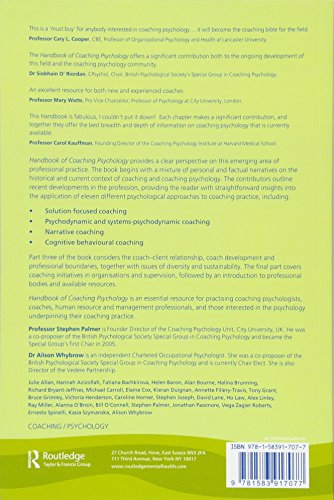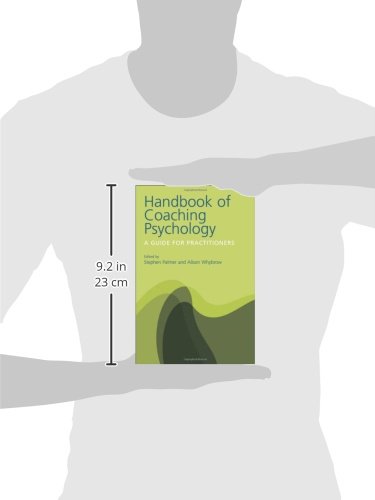Deliver to DESERTCART.BE
IFor best experience Get the App




Full description not available
J**S
Evidence-based coaching - useful for new and seasoned coaches alike
The Handbook of Coaching Psychology: A Guide for Practitioners gives a well-rounded view of the different, evidence-based approaches coaching psychologists may take when working with coachees. From solution-focused coaching to gestalt coaching via cognitive behavioural coaching and motivational interviewing, this book demonstrates just what an eclectic bunch we coaching psychologists are! It is clearly written for practitioners (as it says in the title) and both new and experienced coaches will find it informative and accessible.The handbook was written at a time when the British Psychological Society had only three years previously established its Special Group in Coaching Psychology, so a timely publication for an emerging field of psychology. It is authored/edited by 28 highly credible practitioners, many of whom are ‘big name’ academics in the field, including the dynamic and inspiring Anthony Grant (founder and director of Sydney University’s coaching psychology unit and co-author of Evidence Based Coaching Handbook, 2006); Elaine Cox (Oxford Brookes university and editor of International Journal of Evidence Based Coaching and Mentoring); Professor Stephen Palmer (instrumental in the setting up of the British Psychological Society’s Special Group in Coaching Psychology and director of City University’s coaching psychology unit) and Alex Linley (previously Visiting Professor of Psychology at the University of Leicester).The handbook is divided into four sections: Perspectives and research in coaching psychology (2 chapters); Coaching psychology: approaches (11 chapters); Understanding relationships, diversity and development in coaching and coaching psychology (5 chapters) and Sustainable practice (2 chapters).All chapters are broken into short sub-sections with clear headers which makes it easy to revisit ideas or flick through and find the parts most of interest to the reader. Each of the 11 chapters covering approaches in coaching psychology begins with a short introduction explaining something of its heritage/derivation followed by a ‘theory and basic concepts’ section which I found very useful. Many chapters include useful longer case studies to bring theory to life as well as short sample coach-coachee conversation snippets to illustrate specific points.Each chapter ends with references, discussion points and further reading. The discussion points (for example, from the chapter Person-centred coaching psychology, ‘What is the difference between coaching and counselling as seen from the perspective of the person-centred approach?) are a useful way for the disciplined reader to check her understanding, and, by taking the time to consider them (perhaps in a peer supervision session, if not alone) the reader may find it becomes easier to weave the ideas presented, into her practice.Kieran Duigan’s chapter, Personal construct psychology ends with a brief description of the books he recommends, pointing out specific things each might be useful for and it would have been great if every author had done the same. I would also have appreciated a conclusion/summary section in every chapter to bring the main learning points together and to act as a shortcut for the time-pressed reader (who can then decide whether to read the chapter in its entirety). A chapter on contracting with coachees/clients and running a well-managed coaching practice would also be useful.The Handbook of Coaching Psychology draws heavily on research, as one would expect given the background of many of the contributors, and contains multiple reminders that the whole coaching community has a role to play in deepening our understanding of how coaching works so that we avoid the practitioner/academic divide that exists in so many professions. There are many pointers in the book as to where further research is needed and in Linley & Harrington’s excellent chapter ‘Integrating positive and coaching psychology’ they are explicit about the need for coaching psychologists to do research that is both useful and rigorous, so as to prevent that academic/practitioner divide. The same point is also made by Fillery-Travis and Lane in their equally useful chapter, ‘Research: does coaching work?’ where the central finding is that the relationship between coachee and practitioner is the primary factor that dictates coaching success.In summary, this is a useful book for all coaches, psychologists and other therapists involved in helping people bring about and support change in others. Its coverage is broader, and because of the subsections and clear labeling, is easier to dip in/out of and refer back to than the comparable read Evidence Based Coaching Handbook (Stober and Grant, 2007). For experienced practitioners it is a useful reminder of the many other schools/styles/techniques colleagues may be using that differ from our own and provides ideas we could integrate into our own practice. Being aware of this broader view of coaching psychology can be especially useful when working with ‘seasoned’ coachees who may have worked with some of these different approaches.
G**H
A great resource to help practitioners connect with the psychology in coaching.
Having studied for a Master's degree in Education I wanted a resource that would help me with a new move I am making into coaching. This book I found had the information, both from a theoretical and practical purpose, to help guide me through a range of different psychological approaches to coaching and will be used as a constant companion in the same way the Ian Reece and Stephen Walker's book 'Teaching, Training and Learning'.
D**E
An excellent compendium of the field of coaching psychology
This is an excellent compendium of the research and practice of coaching psychology from some of the leading academics and practitioners in the field. The breadth of coverage on different methodological approaches and in-depth consideration of some of the key issues in coaching psychology including the coach-coachee relationship, use of psychometrics, coach development and the effectiveness of coaching interventions make this a core text for researchers and practitioners alike.
G**R
A useful reference text
A very useful overview of coaching psychology and essential reading if studying for your certificates in Coaching Psychology and/or Performance Coaching.
D**C
Book review
Excellent reference book for the course i attended to carry out the Cognitive Performance Coaching skills obtained on the course.
I**W
Four Stars
Makes interesting reading
D**S
Great if you are doing a psychology degree
University student
R**A
Good
I feel the book was Fitness for purpose, to get a fuller understanding you may need to read it multiple times, however the subject is vast.
Trustpilot
1 week ago
1 month ago